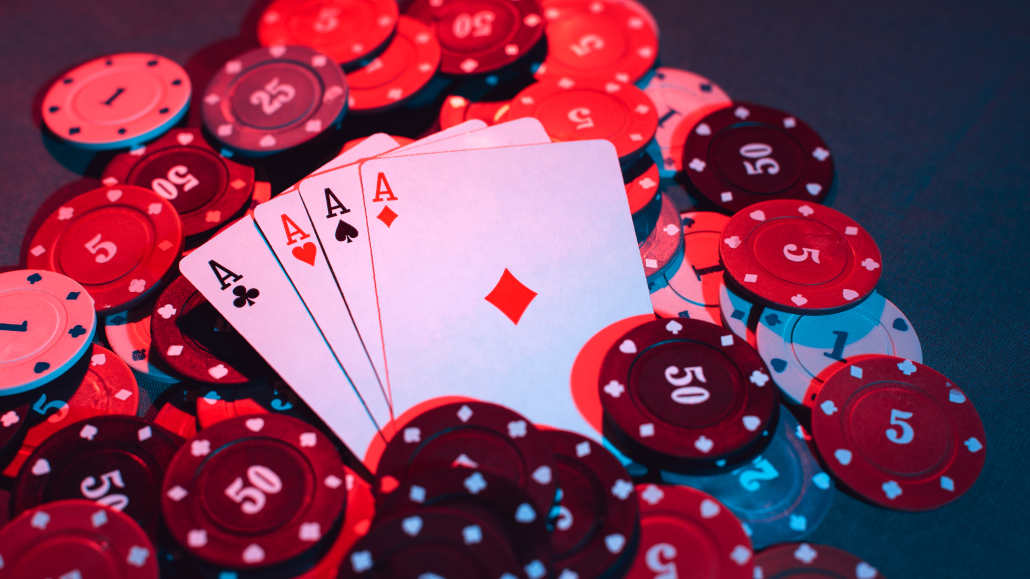How to Play Poker for Dummies – Top 10 Tips for Beginners

7 minutes
Poker is one of those games that can be pretty overwhelming when you are just starting out. Because of this, it is good to have certain guidelines that will help you create a solid foundation that you can build on later on.
Today we explain some of the most important things that, as a beginner, you should pay attention to, or in other words, we explain how to play poker for dummies.
1. Poker for Dummies 101: Learn the Rules
When you get introduced to poker it can be tempting to jump right into the first available game and start playing. However, you should avoid doing this.
Instead, you should delay your first hand of poker for a few days and, in the meantime, learn the rules. This is, by far, the easiest part of learning the game of poker.
Learning the rules of poker is not that hard, and you can probably master them in a couple of hours, so time is not really an excuse that you can use to skip this part.
Since we live in the age of the internet, you don’t have to read books like players did 20 years ago. Instead, there are a lot of sites that explain how poker is played with videos or interactive tools. These are a good place to start.
2. Don’t Play Too Many Hands

One of the mistakes that most new poker players do is watch some of the best poker players on TV or on streams and they want to copy their moves and play a loose-aggressive style.
The thing that they fail to realize is that experience and skill aside, there are numerous other factors that allow these players to play in this way.
This includes stack sizes, antes, recreational players at the table, creating a table image, etc.
When it comes to hand selection, the right approach for a new poker player would be to play as few hands as possible and gradually expand his hand ranges as he becomes more familiar with the game.
If you are not sure what hands you should play, Google “poker starting hands charts” and use the charts you find as a guideline. Don’t worry too much about picking the right-hand chart. Most of them will have very similar starting hands.
3. Avoid Bluffing Too Much
Another mistake that newbie players make is that they bluff too much. In fact, a lot of players get interested in poker because they see a big bluff on TV or in a poker movie and they think to themselves, that looks cool I want to do that.
Well, we have some bad news for you. If you are a beginner, you should not bluff too much. As a newbie poker player, you will probably start playing the game in the micro stakes, and on these stakes, people do not like to fold.
Because of this one of the best strategies that you can implement is to play a narrow range of hands and extract as much value from your good hands as possible.
Expanding your bluffing range, just like expanding your hand ranges, should come later on when you improve your overall poker skill.
4. Learn How Position Impacts Game Dynamics

Position is one of the most important things in the game of poker, and the sooner you realize how position impacts the game, the better.
When they get introduced to the game, a lot of poker players do not think much about position and what it means. In other words, they lack positional awareness.
Learning what position means and how it can guide your decisions will immediately give you an edge over these players.
Remember, poker is a game of information, and the player that acts last on each street will always have more information than the player who does not.
Because of this, even the most skillful poker players on the planet take poker positions into consideration before making their decisions at the table.
5. Poker for Dummies Basics: Don’t Play More Too Many Tables
If you are beginning your poker career online, you will quickly learn that most poker players play multiple tables at the same time to increase their profits.
The reason why they can do this is that they have enough skill and practice to play more than one table without it having a negative impact on their decisions.
If you are just starting out, though, playing more than two tables will probably be too much and your decision-making process will suffer.
So, it is best to start slow, with one or two tables. Only add more when you feel that you have enough experience to track what is happening on all of your tables.
Remember, don’t be fooled by the fact that experienced poker players make playing six tables at the same time look easy. It is really not!
6. Implement Table Selection

One of the most important tips that we want to include in our beginners guide to poker, is table selection.
Table selection is just a cool way of saying that you need to find and play in games with players that are less skillful than you.
If you want to make money playing poker, you need to learn how to put your ego aside and play against players that are worse than you. This is one of the most important skills of good poker players.
Think of it this way. Let’s say that you are the sixth-best player in the world. However, if you are playing against the top five players in the world, you will be losing money.
7. Avoid Games That Can Impact Your General Finances
There are a couple of reasons why you should not play limits that can have an impact on your overall finances.
The first reason is that winning or losing in these games will make it hard to keep your emotions at bay.
Becoming emotional will have a negative impact on your decision making, leading to a suboptimal playing style.
Secondly, suppose you are playing in games with higher limits, especially online. In that case, there is a high chance that most of the players at those limits are superior to you in terms of skill. As we’ve already mentioned, you always want to avoid this.
Lastly, losing money in these games will impact your life in the sense that you will have to cut costs in other areas to make up for the money you lost at poker. This is something that we never recommend.
8. Poker for Dummies Simple Tip: Pay Attention to the Game
Paying attention to the poker game you are playing seems like the obvious thing to do. However, as you will find out, this is not always easy to do.
Often you will have long stretches where the card distribution will not be on your side and you will be forced to fold hand after hand.
During this period, it can be tempting to use the time in between hands to scroll through social media or watch a video. After all, you have nothing else to do.
This is wrong, as you should always pay attention to the action at the table, even when you are not in the hand. You can gather information about other players and their style of play even when you are not directly involved in a pot.
It is often easier to see how other players play when you don’t have to think about your hand and you are free to use all of your brain power to focus on their moves.
9. Think About Your Opponent’s Hand

If there is one thing that can separate you from most of the players that are new to the game it is thinking about other players’ cards.
The majority of players that are new to the game or play the micro stakes only focus on the hand that they have. They almost never think about what hand their opponent is holding, and this is not the right approach to poker.
Even when you have the absolute nuts in a given situation, you should always think about your opponent’s range. This will allow you to make the most profitable decision.
Failing to do so will result in you making decisions only based on your hand (in this case betting big) and this is not the right approach. It will most likely have a suboptimal result, i.e. result in your opponent folding.
10. Learn to Fold
For a player that is new to the game, it can be hard to wrap your head around the fact that folding can also make you money.
This is one of the key principles of poker: making the correct decisions in spots where your opponents make mistakes. In other words, each time that you make a correct fold in a spot where your opponents make a call, you are making money.
We know that it can be hard to resist your curiosity and make a fold when you are dying to see your opponent’s hand, but this is what it takes to be a winning poker player. Don’t make calls when you know you are beaten!
- Poker Squeeze Play – Which Hands Make the Most Sense for Squeezing? - August 10, 2023
- How to Play Low Pocket Pairs in Texas Hold’em - July 29, 2023
- How to Make Deep Runs in MTTs More Often - July 22, 2023















